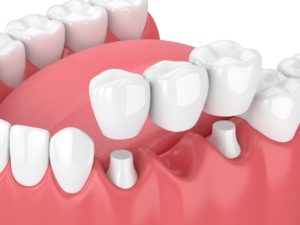 If you’re one of the millions of Americans who have lost a tooth, a dental bridge is a wonderful solution because it restores both the appearance and function of your smile. But, like any dental work, a bridge is an investment that you want to last as long as possible. Fortunately, a bridge can last 10 to 15 years or more! But one common question is, “Can the teeth that support my dental bridge get cavities?” In this blog, you’ll get the answer to that question and learn about the various problems that can cause a bridge to fail. You’ll also get great tips for maintaining your bridge to help it last many years.
If you’re one of the millions of Americans who have lost a tooth, a dental bridge is a wonderful solution because it restores both the appearance and function of your smile. But, like any dental work, a bridge is an investment that you want to last as long as possible. Fortunately, a bridge can last 10 to 15 years or more! But one common question is, “Can the teeth that support my dental bridge get cavities?” In this blog, you’ll get the answer to that question and learn about the various problems that can cause a bridge to fail. You’ll also get great tips for maintaining your bridge to help it last many years.
What Causes a Dental Bridge To Fail?
A bridge relies on having two healthy teeth on either side for support. But, just like regular teeth, these teeth can develop cavities and gum problems. If that happens, the bridge usually has to be removed to treat the issue and then replaced with a new restoration.
Other potential problems include clenching and grinding or chewing on ice or hard candies, all of which can put a bridge at risk for breaking.
How Can You Make Your Dental Bridge Last?
One of the biggest reasons that a dental bridge develops cavities or gum problems is that plaque and food gets trapped underneath. Here’s how to counteract that and prevent your bridge from failing:
- Maintain good oral hygiene at home – Make sure to brush at least twice a day and focus on the gumline around your bridge. You should also use tools like floss threaders, interdental brushes or oral irrigators to clean underneath your bridge.
- Use extra topical fluoride – Using a fluoride mouthwash from the store or asking a dentist for a prescription-strength toothpaste is a great way to prevent cavities.
- Watch your habits – Be mindful when you’re eating hard, crunchy foods like nuts and seeds and be sure to avoid chewing on ice or hard candies.
- Schedule regular checkups – Seeing a restorative dentist regularly is the best way to make sure any issues are found and treated before they cause your bridge to fail.
- Wear a nightguard if necessary – A nightguard won’t prevent you from clenching and grinding, but it will protect both your natural teeth and your bridge from damage.
The better you maintain your bridge, the longer you’re likely to keep it. And with these tips, it couldn’t be easier!
About the Author
Dr. Douglas Wright is a general, cosmetic and restorative dentist with 35 years of experience. His goal is to help his patients maintain their dental work over the long-term, so he always provides tips and tricks to keep everything in great shape. If you’d like to know more about caring for a dental bridge or have any questions, he can be reached via his website.

